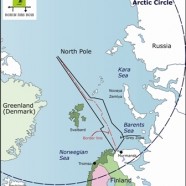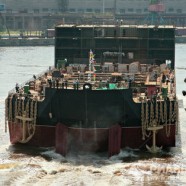Nightmare in the North Sea
At 12:15 on March 25th an incident occurred at the Elgin-Franklin offshore platform complex situated approximately 240km east of Aberdeen. It is estimated that a total 200,000 cubic meters of gas per day, is spreading into the atmosphere and directly impacting 4.8 km2 of the marine environment. According to Total they are currently unable to assess the exact quantity of gas which is leaking into the environment, they have stated that the size of the sheen is reducing.
The cloud of hot gas which reaches temperatures of 190°C around the Elgin platform is explosive in and around the zone. It is within this explosive zone that the emergency team will have to intervene to inject the well with mud to try to cut off the gas. No responsible employer would ever take such a high risk with their workers lives. Even if the depth of water from the well head is only 93 meters it could take up to 6 months to drill relief wells in extremely dangerous situation of explosive gas. Maybe an option could be to sit back and do nothing as has been done before, since 1990 methane gas has continued to leak into the North Sea from a drilling exploration expedition that went wrong at bloc 22/4b. The industry and the British authorities concluded that sealing the well could result in uncontrolled release from new leakage paths in the fragile geologic formation.
Oil Spill in the North Sea
Early last week the Gannet Alpha platform situated approximately 180km east of Aberdeen, Scotland started leaking light crude oil into the North Sea. To date it is believed that some 218 tonnes (1,300 barrels) of oil has leaked from an 8 inch thick pipeline which joins Gannet E and F drilling fields. The leak was only confirmed a couple of days after it started by the operator Shell. The platform continues to operate but the sub-sea line between Gannet E and F has been isolated and the flow line depressurised which should reduce the leak flow.
There is movement in the Arctic
On July 7th 2011 a maritime border agreement between Russia and Norway entered into force. This new dividing line ends a 44 year dispute over 175,000 square kilometres in the Barents and Arctic seas and opens up the former so called “grey zone” for exploration. The day following the entry into force Norway deployed the Harrier Explorer (Imo 7807380) a seismic vessel to start exploration in the zone.
This border agreement follows a Treaty on Cooperation on Aeronautical and Maritime Search and Rescue in the Arctic on May 12th 2011. It is the first legally binding treaty under the circumpolar intergovernmental forum the Arctic Council and was signed in Nuuk Greenland by Canada, Denmark, Finland, Iceland, Norway, Russia, Sweden and the United States of America. The Treaty so called the “Nuuk Agreement” is focused on saving lives. It is an important step towards policy-making as there is an increasing amount of traffic venturing into the Arctic, which includes tankers and passenger ships of which a number were not constructed to navigate in ice-covered waters.
Latest news : ex-Probo Koala
The Gulf Jash, ex- Probo Koala, is anchored in Halong Bay, Vietnam. Today, June 3rd GMS, U.S. based ship broker, denies ownership of the ship. Under this hypothesis, it is for Dubai based Gulf Navigation, owner of the ex- Probo Koala since 2006, to clarify the conditions of the sale and the destination of the vessel.
In accordance with Robin des Bois’ (“Robin Hood” international association based in Paris) press release published May 17th 2011, the Equasis database displays, since May 31st that the Gulf Jash ex-Probo Koala, the Gulf Ahmadi ex-Probo Bison and the Gulf Shagra ex-Probo Panda are indeed “to be broken up”.
Probo Koala To Bangladesh: Refused
Warned by Robin des Bois as early as May 17th 2011 of the Probo Koala’s imminent arrival to be beached for demolition (1), Bangladesh authorities, through its Ministry of Environment & Forest have just closed access to the demolition shipyard to this ship whose last known name was Gulf Jash, IMO number 8309816. This is the first time a ship destined to demolition is turned away from Bangladesh waters. The decision is justified by the history of this tanker and the particularly toxic residue still possibly on board. The list of these substances and a draft of the ship can be found here.
Massive falls of the Robin in the North Sea
Over 50 million migrating birds cross the North Sea twice a year. Birds that use stars for navigation purposes are considerably attracted to the illumination of offshore platforms. Over 7 species are particularly affected by this phenomenon in the North Sea. Impact is at its greatest when the night sky is covered by clouds; it leads to a total disorientation of the birds which circle for hours at night in the ocean around this false constellation which is in fact an offshore platform.
According to the report presented by The Netherlands to other Contracting Parties of the OSPAR Convention, one platform could be responsible for the death of 60,000 birds per year.
Nuclear Power Plants Floating Around the World
The first Russian Floating Nuclear Power Plant (FNPP) was launched at the end of June 2010 (photo #1), the two nuclear reactors with a capacity of 35 MW x2 will be installed, according to the Russian authorities, before 2012. However delays are possible. This new nuclear activity is worrying, particularly because dealing with radioactive waste from Russian ice breakers and nuclear submarines as well as their dismantling continue to be a heavy burden.
Trafigura Captured by Mercaptan and Hydrogen Sulphide
While the Gulf Jash, ex-Probo Koala, is leaving the oily waters of the Gulf of Mexico and while the Aristos II, another tanker chartered by Trafigura, is being scrapped on the muddy beaches of Chittagong in Bangladesh, the judgement of the Amsterdam court course is showing a new light on the dark side of traders and marine traffic.
The misinformation by the multinational Trafigura is denied. According to their spokespeople, lawyers and their spin doctors everything which happened in Abidijan is “a myth”. Amsterdam’s judgement confirms that the waste from the Merox desulphurisation onboard the Probo Koala was toxic and dangerous. Four years after the Probo Koala’s stop in The Netherlands, this judgement puts an end to the alleged irresponsibility of Trafigura. In spite of the breaking up of responsibility in place in shipping, each link in the chain, on land and at sea, has been grasped by the justice.











